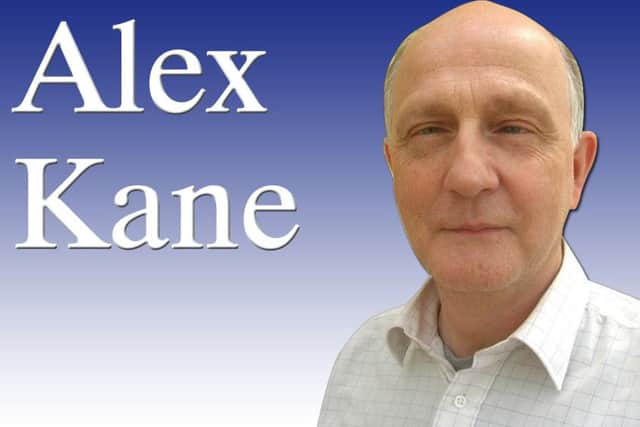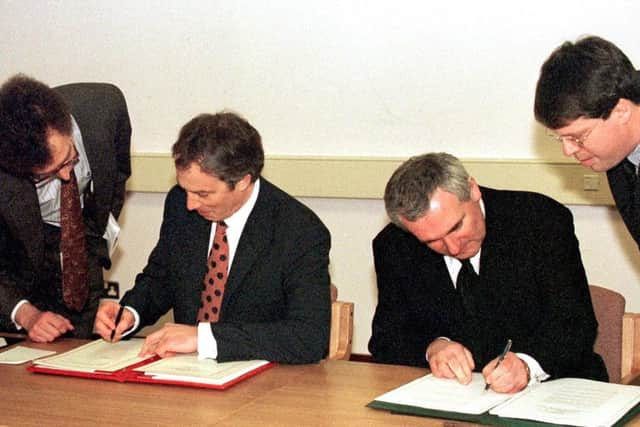Alex Kane: Time to accept that the Good Friday Agreement has not delivered
and live on Freeview channel 276
It is a land of continuing ‘celebration’ and hollow-eyed commemoration: July 12; Relief of Derry; graveside oratories; murals; flags; parades; volunteers from both sides honoured etc., etc. All of this is us-and-them. Orange and green. Unionism and republicanism. We don’t have shared memories and narratives.
Almost every week now brings the 20th, 30th or 40th anniversary from the last round of Troubles – with a mixture of older relatives standing beside a new generation of younger relatives; and both generations sharing the same anger. Yesterday was a 20th anniversary service for the Omagh bombing and there is understandable anger that neither Leo Varadkar nor Karen Bradley seems able to attend. Meanwhile, another generation of political leaders and community spokespeople have lifted the baggage left by their predecessors and carry it forward.
Advertisement
Hide AdAdvertisement
Hide AdA few years ago it was suggested that there be a single day of commemoration or remembrance: a day when we could remember what matters most to us, while also celebrating the fact that Northern Ireland had changed and that we are in a better, more peaceful place. The problem, of course, is that too many people feared that such a day would inculcate the idea that there was sort some of equivalence between the killed and the killer; between the forces of the state and the paramilitary organisations; between the grief of the families of innocent victims and the grief of the families whose son, daughter, father, mother or relative had pulled the trigger or planted the bomb.


The other problem with a single, national day of remembrance is that it only works when you have a genuine settlement; in other words, when all sides have reached a consensus and agreed to move ahead together. It cannot work when the best you have is stalemate; because stalemate is an agreement not to use violence to settle or steer disagreement but, crucially, isn’t an agreement about the constitutional future of your country. So the source of the conflict remains unresolved, which means that all we do is find other ways of pursuing the conflict and highlighting our differences.
A few months ago I was invited to a private meeting with a small group of people who had lost members of their family to terrorists from both sides. One woman put it like this: “I think I would have been able to come to terms with the fact that I would never see justice or accountability for my husband’s death if there were signs that Northern Ireland had changed. But I think we’re more divided than we were. Sure, we haven’t even had a government for 13 months. The same parties are fighting the same old arguments. I voted Yes in the 1998 referendum – although many members of my family didn’t – because I hoped, prayed, that it would take us to a place in which it would become impossible for another generation of violence and pain. I never wanted to go back there. I never wanted anyone to know the pain I have carried every single day for 30 years. But I’m telling you this, Alex, I believe there will be more violence. I believe there will be more pain. I believe that the politics we have now isn’t working. It’s not about peace and reconciliation. I want my grandchildren to leave here.” Every other person in the room nodded.
I taped the conversation. I listened back to it on the way home from the meeting. I have listened to it almost every day since then. And I cannot think of one argument to counter her distress. She didn’t want her husband’s death to have been in vain. She now thinks it has been. She is in despair. No justice. No accountability. No relief or lifting of her pain. No overwhelming evidence that violence has become a thing of the past, never to return. No real proof that Northern Ireland has changed when it comes to politics, elections and social/community integration. I wrote her words down last Wednesday and deleted the tape. It was too painful to hear again.
Advertisement
Hide AdAdvertisement
Hide AdI wonder how many other people who voted Yes in 1998 feel the way she feels. I voted Yes. I believed that it was the right thing to do at the time (even though friends and family members had been killed and injured) because it seemed to me that everything else had been tried and failed. There was no evidence that successive UK/Irish governments were committed to the wholesale destruction of terrorism, yet plenty of evidence that they were determined to construct and shore up a deal that could be sold to both sets of terrorist.


Yes, both the DUP and other smaller unionist parties argued against the Good Friday Agreement, but none of them had a viable and available alternative. Which is why the DUP ended up cutting its own deal with SF in 2007.
But I accept that the change I hoped the GFA would deliver – and I wrote about it a few years ago – has not been delivered and won’t be delivered now. The division between unionism and republicanism is too wide to bridge and too toxic to heal. This has nothing to do with Brexit, by the way, the chasm and toxicity have been evident long before that.
I think we have to face the fact – and again, I wrote about this just over a year ago, before the 20th anniversary – that the GFA has failed in its primary purpose, that of finding a new way of doing politics here. Unless, of course, the DUP and SF get their act together and prove me wrong. I’m not holding my breath.